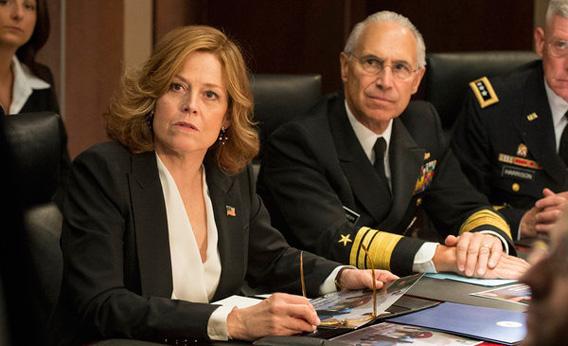“Did you just think your political career was over so you no longer had to tolerate his rampant infidelity?” journalist Susan Berg (Carla Gugino) asks former first lady and Secretary of State Elaine Barrish (Sigourney Weaver) at the beginning of USA Network’s new miniseries Political Animals, which premieres this Sunday. “Were you surprised at the public’s reaction to the split, that the president was suddenly despised for the same repugnant sexual behavior that the public used to find roguish and cute?” The president Susan’s asking about is former President Bud Barrish (Ciaran Hinds), whom Elaine kicked to the curb after she ended her own bid for the presidency. But we all know that Susan is actually referring to Bill Clinton and that the questions posed are ones we would love to ask Hillary. That’s exactly the wicked appeal of Political Animals, which gleefully bucks the Hollywood tendency to deny that any political movie is based on an actual politician.
When I was a child, the Clintons were the first family other than my own that I paid serious attention to and tried to understand. I saw Bill and Hillary speak on one of Bill’s first campaign stops in Vermont during his 1992 race for the presidency, the two of them isolated on a stage in what seemed like a vast sea of people, close and yet untouchable as they shook hands through the window of their car on the way out of the rally before the Secret Service began to push back the crowds. I owned Dear Chelsea, a book of letters to the First Daughter. And during a tour of the White House’s West Wing arranged by a relative, I got to watch a chef take a late-night order from the president, gaining a permanent inside perspective on that SNL sketch about Bill’s McDonald’s weakness.
But as I grew older, and as the Monica Lewinsky scandal spread across newspapers like mold during my last year of middle school, my interest narrowed to a single member of the Clinton clan, and to a single set of questions. How did someone like Hillary Rodham end up married to a guy like Bill Clinton? What did it feel like to be cheated on? Why did she stay? And how could I avoid the same fate? In college, while navigating my first serious relationships, I read Gail Sheehy’s Hillary’s Choice and became obsessed with the movie adaptation of Joe Klein’s Primary Colors, which offered up a version of Hillary, played by Emma Thompson, who was strategically brilliant but at the limit of her capacity to withstand pain.
“She was drawing attention to her perfection, which only served to remind people of her husband’s imperfection,” Klein’s narrator observes in the novel, after she puts on a televised show of marital devotion. “It was, I realized, a vengeful act.” That was the nightmare, to become an ideal, the first student to give a commencement address at Wellesley, the brilliant up-and-coming lawyer, only to be left using your best qualities as a weapon, rather than as a tool to achieve happiness.
Elaine Barrish is a fun, alternate-history version of Hillary Clinton, one who tossed her husband aside, has her hair totally figured out instead of in constant flux, and snarks at the vice president (Dylan Baker), a lightweight who wants to get involved in hostage negotiations with Iran on the strength of his experience in a similar situation. “That was Mexico. And two college students smuggling a Volvo of pot,” Elaine eviscerates him. “This is Iran accusing American journalists of being spies. These negotiations won’t happen over margaritas.”
Elaine is a version of Hillary, and the show doesn’t shy away from interrogating her dissolved marriage—whether it’s Susan (a very clear stand-in for Maureen Dowd, who won a Pulitzer Prize for her commentary on the Lewinsky scandal) asking direct questions, or the camera following Elaine as she sees Bud for the first time since their divorce.
There have always been theories about the Clinton marriage: that it’s of political or personal convenience, that they have a deal that lets him cheat in exchange for his support of her career, that Hillary is just so bonkers in love with Bill that she will forgive him anything. And as a young woman, I hoped there was a true answer out there that was both clear and empowering.
But Political Animals is a nudge in the ribs reminding me that my hope is hopeless, and that’s what makes the Clintons, and marriage, and adulthood compelling and heartbreaking, both in art and in life. In the second episode, there’s a flashback to Elaine and Bud’s time in the White House that acts as the corollary to the questions Susan asks of Elaine. Bud says to his wife, “You should leave me. I’ll cheat again. And I’ll lie again. And I’ll break your heart again. Retain Stacy Phillips. You have to come out of this looking good. You get no flack from me, Elaine.” But she stays until the moment, impossible to explain or justify to anyone, where she’s finally had enough.
As much as I wish I could save myself some heartache, there is no clear answer as to how Hillary and Elaine ended up with Bill and Bud, why Hillary stayed, and why in Political Animals, Elaine left. Hillary and Elaine are reminders that strength and brilliance won’t save us from complexity, confusion, error and pain. Instead, they’re tools to use to work through the most difficult decisions of our lives.
